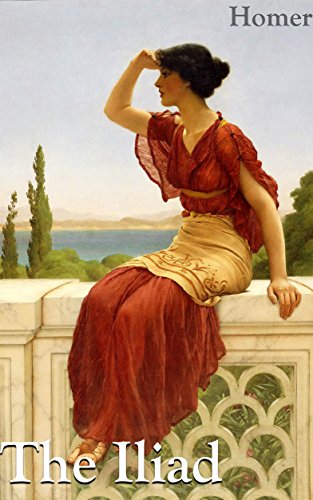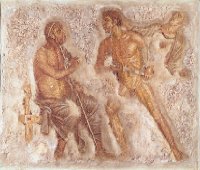
The Iliad (sometimes referred to as the Song of Ilion or Song of Ilium) is an ancient Greek epic poem originally written in dactylic hexameter, set during the Trojan War, the ten-year siege of the city of Troy (Ilium). The poem is traditionally attributed to the poet Homer.
The Iliad was a standard work of great importance already in Classical Greece and remained so throughout the Hellenistic and Byzantine periods. It made its return to Italy and Western Europe in the 15th century.
This collection includes three different translations of the Iliad into English.
Samuel Butler’s translation reshapes the original poem into prose. This translation sidesteps many of the problems encountered by translators trying to conform the archaic Greek meter to English and provides a highly readable text.
Edward Smith-Stanley (the Earl of Derby)’s translation is closely allied to the original Greek and has been hailed as “superior to any that has yet been attempted in the blank verse”.
Alexander Pope’s translation makes use of heroic couplets (poems constructed from a sequence of rhyming pairs of lines in iambic pentameter) and has been praised as "a performance which no age or nation could hope to equal" but also criticized for it’s poetic liberties with the original Greek.
A Look Inside: The Iliad [Click Images to Enlarge]

First Seven Lines of the Iliad: This reconstruction is based on what we know about the earliest Greek orthography.

The Walls of Troy: The translator standing before the walls of the sixth city at Troy.

The Judgment of Paris: On the right a youthful Paris sits on a stone in a rural location. The sheep near his feet indicates that he is a shepherd. Athenian red-figure water jar, c. 450 BC.

The Rage of Achilles: The seated Agamemnon holds the scepter of authority and sits on a throne, his lower body wrapped in a robe. Athena seizes Achilles from behind by the hair. Roman mosaic from Pompeii, c. First Century AD.

The Wedding of Zeus and Hera: A half-naked Zeus, sitting on a rock, clasps the wrist of Hera. One of her breasts is exposed as Hera removes her head covering in a traditional gesture of submission. c. 540 BC

Hephaistos Prepares Arms for Achilles: The smithy-god, bearded and wearing a felt cap, sits in an elaborately draped hall on a platform holding a cloth with which he is polishing the finished shield. Between him and Thetis are the breastplate and the shinguards (the surface of the fresco is damaged here). From Pompeii, c. AD 60.
The Iliad was a standard work of great importance already in Classical Greece and remained so throughout the Hellenistic and Byzantine periods. It made its return to Italy and Western Europe in the 15th century.
This collection includes three different translations of the Iliad into English.
Samuel Butler’s translation reshapes the original poem into prose. This translation sidesteps many of the problems encountered by translators trying to conform the archaic Greek meter to English and provides a highly readable text.
Edward Smith-Stanley (the Earl of Derby)’s translation is closely allied to the original Greek and has been hailed as “superior to any that has yet been attempted in the blank verse”.
Alexander Pope’s translation makes use of heroic couplets (poems constructed from a sequence of rhyming pairs of lines in iambic pentameter) and has been praised as "a performance which no age or nation could hope to equal" but also criticized for it’s poetic liberties with the original Greek. .
Read The Iliad: Filibooks Classics (Illustrated) complete books online for free. Reading The Iliad: Filibooks Classics (Illustrated) full free books online without downloading.
Looking up to the full article E-Books free download? Here you can read.
